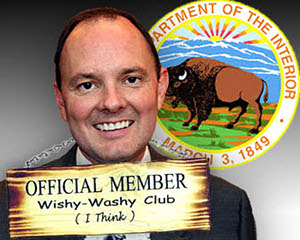 A federally recognized Indian tribe in Oklahoma is suing the federal government over its attempts to block the tribe from operating an online gambling site serving non-US residents. The Cheyenne and Arapaho Tribes of Oklahoma have sued Department of the Interior officials over their objections to the tribe’s PokerTribes.com site, which planned to offer real-money online casino and poker games to international customers, while blocking those living in the US. The site is powered by US-based Universal Entertainment Group (UEG), which operates its own social poker site, UEGpoker.com, as well as various music and entertainment services.
A federally recognized Indian tribe in Oklahoma is suing the federal government over its attempts to block the tribe from operating an online gambling site serving non-US residents. The Cheyenne and Arapaho Tribes of Oklahoma have sued Department of the Interior officials over their objections to the tribe’s PokerTribes.com site, which planned to offer real-money online casino and poker games to international customers, while blocking those living in the US. The site is powered by US-based Universal Entertainment Group (UEG), which operates its own social poker site, UEGpoker.com, as well as various music and entertainment services.
In April, the tribe struck an agreement with state officials to authorize the online site, for which the state would receive a 20% share of the online revenue. This was different from the terms contained in the 2005 tribal-state compact covering the tribe’s four brick-and-mortar casino operations, which stipulated the state’s share as 4% of the first $10m in annual net revenue from electronic gambling, 5% of the next $10m, 6% of any amount over $20m, as well as 10% of revenue from non-house-banked card games (aka poker).
WISHY WASHBURN
In August, Kevin Washburn (pictured below right), Assistant Secretary of Indian Affairs at the Department of the Interior, sent Cheyenne and Arapaho Gov. Janice Prairie-Chief Boswell a letter stating the Department’s objections to the proposal. In doing so, Washburn noted that the new agreement twixt tribe and state “does not expand the scope of gaming authorized under the existing compact. Rather, it provides a different method of delivering types of games already permitted under the compact.” As such, Washburn said the state had failed to offer the tribe “meaningful concessions” in return for the enlarged revenue share, as required under the terms of the Indian Gaming Regulatory Act (IGRA).
 In response to Washburn’s letter, the tribe and state agreed in September to share online revenue based on the same rate as that stipulated for the brick-and-mortar casinos. In November, Washburn issued a new response outlining the Department’s objections to the amended agreement. But in doing so, Washburn directly contradicted his previous letter by saying the agreement “modifies the existing compact by expanding the scope of the games the tribe is currently operating to include internet gaming as part of the compact’s covered games.”
In response to Washburn’s letter, the tribe and state agreed in September to share online revenue based on the same rate as that stipulated for the brick-and-mortar casinos. In November, Washburn issued a new response outlining the Department’s objections to the amended agreement. But in doing so, Washburn directly contradicted his previous letter by saying the agreement “modifies the existing compact by expanding the scope of the games the tribe is currently operating to include internet gaming as part of the compact’s covered games.”
As for the state’s required concession, Washburn said the state “cannot control, nor can it offer, exclusive access to a market of patrons located entirely outside the United States and its territories. As such, the state’s concession is illusory. Therefore, the revenue sharing requirement for the proposed internet gaming activities amounts to an impermissible tax in violation of IGRA.” Washburn said the feds “appreciate the efforts” of both state and tribe to work together to reach agreement on this matter, but the Department “cannot approve a compact that violates IGRA in the manner described above.”
THE TRIBE STRIKES BACK
On December 9, Steven K. Mullins, general counsel to Oklahoma Gov. Mary Fallin, sent a letter to Boswell reiterating the state’s stance that the amended agreement was copacetic with the State Tribal Gaming Act of 2004. Mullins also said the online exclusivity fee “was justified and not illusory” due to its prohibition against non-tribal third parties participating in the online party.
In late December, the tribe filed a lawsuit (read the complaint here) in United States District Court for the Western District of Oklahoma against Washburn and Department of the Interior secretary Sally Jewell, arguing that Washburn’s “illusory” comment is itself illusory. Attorney Richard Grellner argues that Washburn is “plainly mistaken” in his view that Oklahoma officials were attempting to control the international gambling market; rather, Grellner said the state’s goal was to prevent “non-Indian owned enterprises in Oklahoma” from offering services to international gamblers, something well within the state’s power and the exercising of that power would entitle the state to the aforementioned revenue share.
Grellner notes that the tribe had “an enormous stake” in realizing their online gambling ambitions, having “devoted precious and significant resources” to developing the website in conjunction with UEG. Last April, the Native Times reported that check copies indicated the tribe paid UEG $6.8m between April 2012 and January 2013 for costs associated with the website, while Grellner told The Oklahoman last month that the total outlay amounted to $9.4m. CalvinAyre.com has previously reached out to UEG for comment regarding the PokerTribes site but never received a response.
Grellner argues that the tribe only proceeded with its online gambling plans after receiving “informal assurance of eventual approval from dependable sources in the federal government.” Grellner says the state and tribe both regarded their amended agreement as a “clarification” of their existing compact, “rather than a substantive change requiring approval” from the feds. Regardless, the parties submitted the agreement to the feds “as a matter of courtesy.”
In his August letter, Washburn said the tribe had failed to demonstrate that online gambling “would provide substantial economic benefits to the Tribes in a manner justifying the revenue sharing required.” The tribe responded by forwarding a “comprehensive market study” of the global online gambling market, of which the tribe hoped to capture 2% by 2018, which would be worth $132m in gross revenue on an annual basis.
Grellner’s complaint concludes by labeling Washburn’s disapproval as “arbitrary and capricious, an abuse of discretion and otherwise in violation of law.” The tribe is seeking protection from any further interference or obstruction by the Department against the PokerTribes site as well as attorney fees, court costs and such additional relief as the Court may deem just and proper.
GRELLNER OBJECTS
CalvinAyre.com contacted Grellner regarding the lawsuit, which he described as intended “to remove [the federal agency’s] specific disapproval” once and for all so that the gambling site could finally get underway. Grellner said he didn’t believe Washburn had spoken in error in August when the official said online gambling didn’t represent an expansion of the tribal-state compact, and that Washburn’s November position that online gambling did expand the compact’s scope was “the only card left” for Washburn to play after the tribe and state had resolved Washburn’s previous objections. Should the lawsuit prove unsuccessful, Grellner wouldn’t rule out the possibility that the tribe would seek compensation for the sums they’d spent in developing the site.
In October, the Cheyenne and Arapaho tribes had run advertisements urging the federal government to ignore the “hypocrisy” of some other federally recognized tribes with greater lobbying clout that objected to the PokerTribes plan. Grellner acknowledged that the tribes had felt “there was a lot of opposition” to their plan but he couldn’t say whether the tribe was still of the opinion that other tribes were prodding the Department of Interior to keep PokerTribes offline.
Grellner said the tribe had consulted with “regulatory structures in the UK, Gibraltar” and other gaming hubs to ensure compliance with all the jurisdictions from which the site will accept customers. As for the tribe’s projection that it could capture 2% of the global online gambling market, Grellner said “that’s the hope” and that the tribe had arrived at this figure following a study it had commissioned. Most industry observers believe this to be a hugely ambitious and highly improbable goal, but hey, PokerStars was once just a gleam in Isai Scheinberg’s eye, so dare to dream, right? Regardless, Calvin Ayre’s prediction that 2014 would see tribes becoming more assertive over their right to offer online gambling has already been proven correct.
